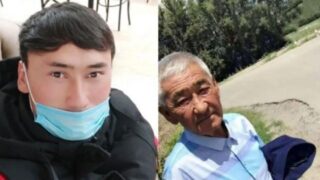The Chinese Embassy in Bishkek wants to stop independent reporting about the horrific experiences in the camps and the kidnapping of students in Kyrgyzstan.
by Alinur Akmatov


At least 10,000 ethnic Kyrgyz were detained in the transformation through education camps in Akto County, which is part of Kizilsu Kyrgyz Autonomous Prefecture (KKAP) in China’s Xinjiang Uyghur Autonomous Region, according to refugees who escaped to Kyrgyzstan. Others were detained in Artux city, the KKAP’s capital, and in Akqi and Wuqia counties, bringing the total to 25,000 or more. Artux itself hosts a transformation through education camp, as documented by the award-winning China Cables, published in 2019 by the International Consortium of Investigative Journalists.
Some 170,000 ethnic Kyrgyz live in the KKAP, although two thirds of its inhabitants are now Uyghurs. 80% of all ethnic Kyrgyz who are Chinese citizens live in the KKAP.
Last month, the story of one former female inmate of the camps who went under the pseudonym of Aygul caused a sensation in Kyrgyzstan after it was reported by Azattyk, the Kyrgyz-language affiliate of Radio Free Europe. “Aygul,” an ethnic Kyrgyz with a Chinese passport, reported that she came to Kyrgyzstan to study there. In 2017, the Chinese Embassy asked her and other students to board a bus and go to the Chinese border post of the Torugart Pass for a “document check.”


The students had not been previously harassed in Kyrgyzstan and went to the Torugart Pass without suspects. However, according to Aygul, as soon as they had passed the border they were kidnapped by Chinese Public Security officers, who handcuffed them and put black cloth bags on their heads.
They found themselves in Xinjiang’s transformation through education camps. Aygul reported that from 10 to 15 women and girls, including minors, all ethnic Kyrgyz, were compelled to live in cells originally intended for one person. There was only one bucket per cell. The food consisted of grass and herbs in boiling water, and they had to drink dirty water, which caused several inmates to get sick. Aygul and the other women had to get up at 5:30, sing the Chinese anthem, and spend their days memorizing texts of the Chinese Communist Party. According to Aygul, they were also frequently beaten by the guards.
They had not committed any crime. Those detained had studied abroad, in Kyrgyzstan or Kazakhstan, or had on their cell phones apps such as Instagram or Telegram that are banned in China.


Aygul moved permanently to Kyrgyzstan after her release and obtained the Kyrgyz citizenship. She is not the only ethnic Kyrgyz survivor of Xinjiang’s camps who has told her story to the world. In April 2022, thanks to the Victims of Communism Memorial Foundation, another Kyrgyz survivor, Ovalbek Turdakun, went to the United States through Istanbul with his family and told his story in a press conference. Unlike Aygul, Turdakun is a Christian, and the story of his detention in a transformation through education camp gives the lie to the CCP’s propaganda argument that the camps are needed to counter “Islamic radicalism.”


The Chinese Embassy in Bishkek is not happy about these developments. It is exerting tremendous pressure on both the Kyrgyz government and the media not to report stories of Kyrgyz victims of the re-education camps system. It also published a press release claiming that Aygul’s story is fictional, that the camps are just “vocational schools” needed to prevent Islamic radicalization, that the recent United Nations human rights report on Xinjiang that says otherwise was “planned and fabricated by the United States and some Western forces,” and former U.N. High Commissioner for Human Rights Michelle Bachelet did not agree with its content. Why Christians such as Ovalbek Turdakun were detained in camps allegedly aimed at preventing “Islamic radicalism” was not explained.









